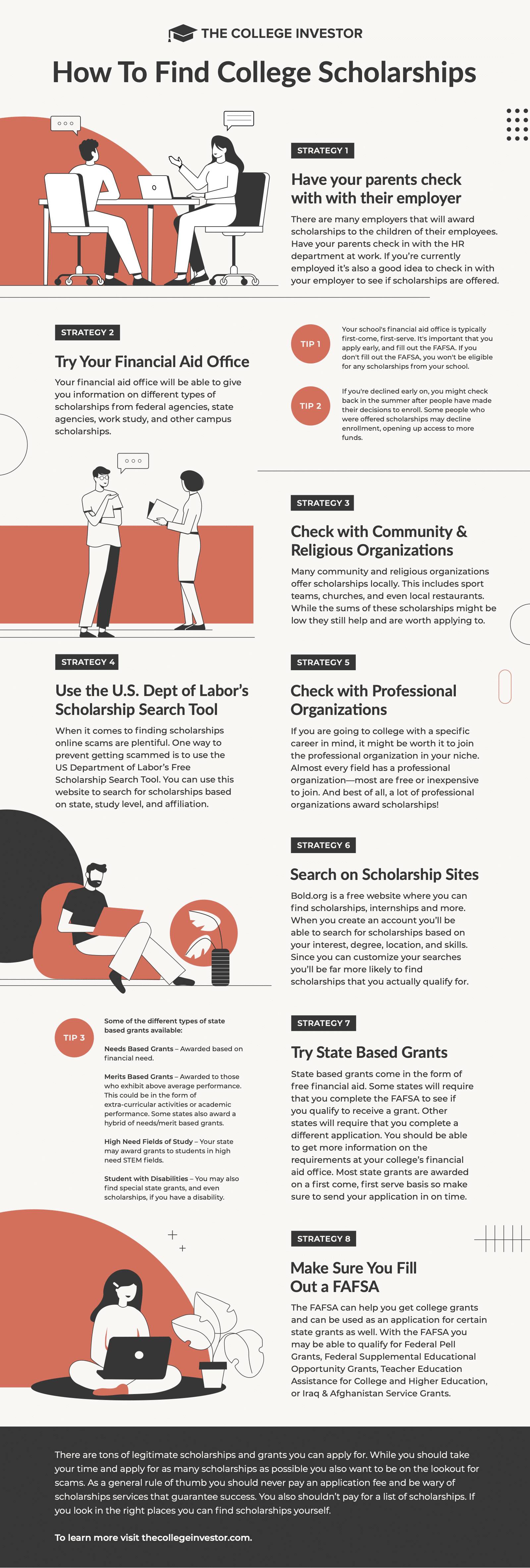This article originally appeared on TheCollegeInvestor.com.
Scholarships are one of the best ways to pay for college—free money! But trying to find scholarships is no easy task. With tuition prices rising, many local scholarships have stiff competition. And when looking for scholarships online, you have to weed through layers of junk to find legitimate ones to apply for.
Even though trying to find scholarships can be a pain, it’s something you most definitely should do. You might be surprised—the competition may not be as tough as you think. And if you systematize your application process, you can apply for a lot of scholarships in a little time. Here's what you need to do and know to find college scholarships.

Infographic by The College Investor
Have your parents check with their employer
Many employers award scholarships to the children of their employees, including federal offices, national brands like Verizon and Intel, and even smaller local businesses. Have your parents check in with the HR department at work about opportunities. If you’re currently employed, it’s also a good idea to check in with your employer to see if they offer any scholarships.
Related: How You Could Go to College for Free on a Big Company's Dime
Try your financial aid office
Your college’s financial aid office can give you information on different types of scholarships from federal and state agencies, work-study, and other campus scholarships. However, institutional aid is typically first come, first served, so applying and filling out the FAFSA early is important. You should also check back about scholarship opportunities in the summer after other students have made their decisions to enroll. Some who were offered scholarships may have declined enrollment, which opens up access to more funds for you.
Check with community and religious organizations
Many community and religious organizations offer scholarships locally. This includes sports teams, churches, and even local restaurants. While the sums of these scholarships may be low, they still help and are worth applying to.
Related: The Pros and Cons of Big and Small Scholarship Awards
Use the US Department of Labor’s free scholarship search tool
When it comes to finding scholarships, online scams are plentiful. One way to prevent getting scammed is to use the US Department of Labor’s Free Scholarship Finder. You can use this website to search for scholarships based on state, study level, and affiliation. This makes finding more scholarships you might be eligible for easy.
Check with professional organizations
If you’re going into college with a specific career in mind, then it might be worth it to go ahead and join the professional organization in your niche. Almost every career field has a professional organization, and most are free or inexpensive to join. Best of all, a lot of professional organizations award scholarships! Some examples include:
- American Bar Association
- American Marketing Association
- National Women’s Studies Association
- National Society of Professional Engineers
Search on scholarship sites
Bold.org is a free website where you can find scholarships, internships, and more. When you create an account, you’ll be able to search for scholarships based on your interest, degree, location, and skills. Since you can customize your searches you’ll be far more likely to find scholarships that you actually qualify for. You can find other great scholarship search engines on CollegeXpress.com, Scholarships.com, and more.
Related: The Best Scholarship Search Sites, Books, and More
Try state-based grants
Like scholarships, state-based grants come in the form of free financial aid. Need-based grants are awarded based on financial need, while merit-based grants are awarded to students who exhibit above-average performance in extracurriculars or academics. Some states also award a hybrid of need- and merit-based grants, including grants for high-need fields of study and students with disabilities. Some states require you to complete the FAFSA to see if you qualify to receive a grant, while others will require a different application. It’s important to note that most state grants are awarded on a first-come, first-served basis, so make sure you get your applications in on time.
Fill out the FAFSA
The Free Application for Federal Student Aid—better known as the FAFSA—should be one of the first things you worry about as a high school senior. This form can help you get institutional scholarships and grants as well as certain state and federal grants. With the FAFSA, you may be able to qualify for:
- Federal Pell Grants
- Federal Supplemental Educational Opportunity Grants (FSEOG)
- Teacher Education Assistance for College and Higher Education (TEACH Grants)
- Iraq and Afghanistan Service Grants
Related: The Best Advice and Resources for Filling Out the FAFSA
As you can see, there are tons of legitimate scholarships and grants you can win. While you should take your time and apply for as many as possible, you also want to be on the lookout for scams. As a general rule of thumb, you should never pay an application fee for a scholarship, and always be wary of services that guarantee success. You should also never pay for a list of scholarships. If you look in the right places, you can find them yourself. Good luck!
November is National Scholarship Month! Celebrate by downloading our free scholarship search template to organize all your applications, and read more advice on finding and winning scholarships on CollegeXpress.






